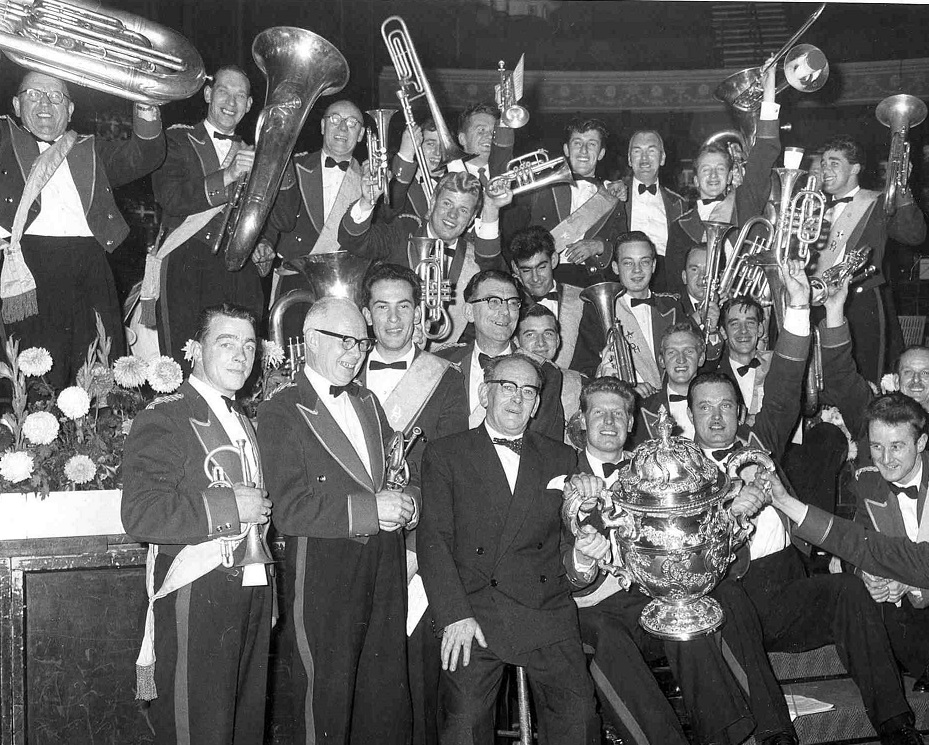
Mortimer at the mythical peak of his inspiratoinal powers: The Albert Hall victory of 1962
Alex Mortimer was one of the most successful and colourful characters in the history of the brass band movement.
Variously described as an ‘ogre’, 'genius' and ‘psychologist’, he is indelibly remembered as the conductor of the great post-war CWS (Manchester) Band, although he was also an outstanding euphonium player with the pre-war Foden’s Motor Works Band and a successful orchestral musician.
Alex was the middle of the three Mortimer brothers - born three years after Harry (1902-1992) and six before Rex (1911-1999) in Hebden Bridge, the sons of the legendary Fred (1879-1953). There were also two sisters, Louie and Marion.
Character
He first played cornet with Luton Red Cross Band after the family moved to the town at the instigation of William Halliwell. Following a bout of rheumatic fever, which seriously strained his heart, he stopped playing until he was 15, when he took up the euphonium.
It was the making of him - his character formed as he finally emerged from the imposing shadow of his elder brother to become second euphonium in the band that triumphed at Crystal Palace in 1923. Both Halliwell and Fred Mortimer were of the view that Alex, already described by his brother Harry as 'the finest euphonium player I have ever heard', should be moved to the end chair.
However, the band committee would have none of it, and with one of Halliwell's other bands, Foden’s needing a solo euphonium, Alex was recommended and offered the job.
Both Halliwell and Fred Mortimer were of the view that Alex, already described by his brother Harry as 'the finest euphonium player I have ever heard', should be moved to the end chair.
Aged 19, he was not the confident, almost arrogant exhibitionist of later years; the illness of his youth had permanently weakened him. However, his determination to succeed overcame any fears.
The decade or more of Foden’s success that followed had much to do with him as a player as it had with his illustrious older brother.
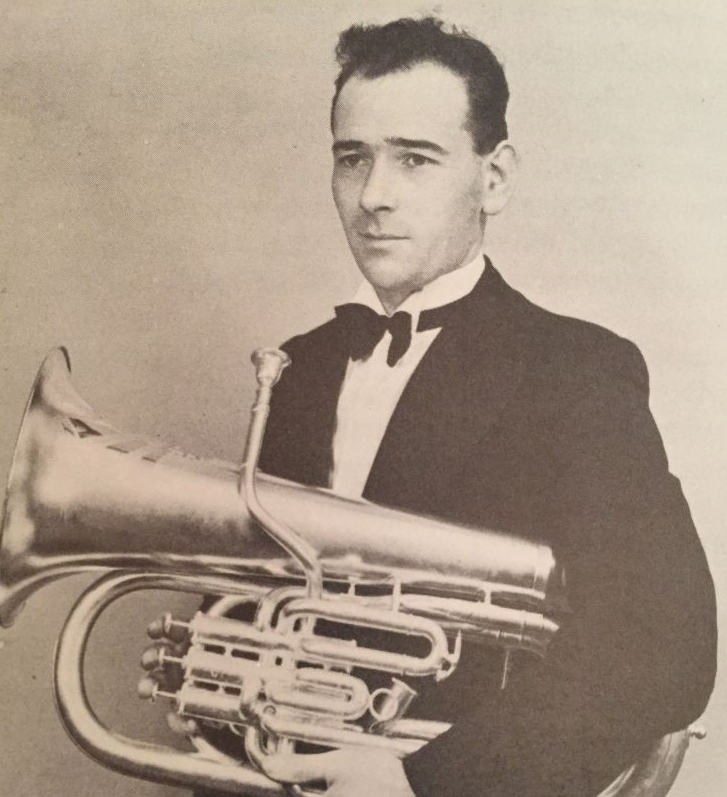
The finest euphonium player in the world and the best musician of us all...
The best
Not that Harry had any doubts: In his autobiography ‘On Brass’, he stated that Alex, “...was a brilliant musician. I think, really, he was the best musician of the four of us."
Given that the two men had a rather tetchy adult relationship it was a remarkably generous accolade to bestow in retirement.
Not that Harry had any doubts: In his autobiography ‘On Brass’, he stated that Alex, “...was a brilliant musician. I think, really, he was the best musician of the four of us."
With Foden’s Alex won a Belle Vue hat-trick (1926/27/28) - surely more if Fred Mortimer hadn’t taken a dislike to the place - and the National Championship on seven occasions (1930, 1932/33/34 and 1936/37/38).
In 1941 his only solo recording was issued - a refined performance of his own arrangement of ‘Drinking - In Cellar Cool’, which can be heard on the Foden’s ‘Centenary Brass’ double CD (Doyen CD DOY 100).
Alex continued to play with Foden’s until July 1943, combining his band playing with a growing orchestral career.
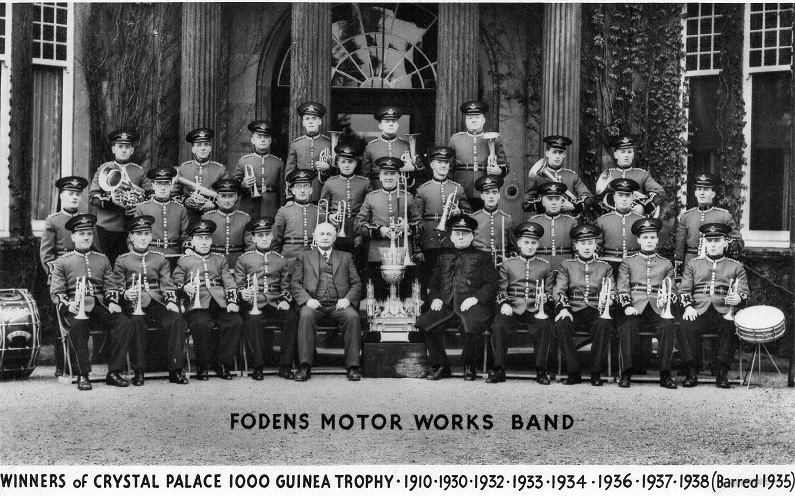
As part of perhaps the finest brass band in history...
In 1929 he had joined the Halle Orchestra as a tuba player and, ten years later, the Liverpool Philharmonic Orchestra. He also performed with the then BBC Northern Orchestra.
Conductor
At some stage he also developed his conducting skills - from 1935 to 1937 taking Crewe Steam Sheds Band at the May Belle Vue contest. Later he took the I.C.I. Band to the same contest in 1947 and 1948 and in 1949 joined Scottish CWS Band, taking them to the Edinburgh International contest.
His name, if not his immediate contesting success soon saw him appointed Bandmaster, then MD, at Black Dyke Mills in 1949. The family connection (Harry was the professional conductor from 1947-49 and again from 1954-56) may have had some part in it, but the five year tenure certainly formed his unique musical approach.
Alex was a different person altogether. He would get the utmost detail out of a piece; he would dissect it and put it together again.
Denzil Stephens was solo euphonium during the brother’s time at Queensbury, and experienced it first hand.
“With Harry there was little fuss. After a couple of rehearsals, a piece would be shaped and ready for presentation.
Alex was a different person altogether. He would get the utmost detail out of a piece; he would dissect it and put it together again."
However, he also felt Alex went overboard: “He would exaggerate nuances, exaggerate balances, exaggerate tempos - he sometimes used to take things so fast that he would leave us all breathless at the end. Now Harry would never do that - he was a much more sensible chap."
CWS (Manchester)
Although Alex led Black Dyke to the 1951 National title, and third place in1953, his desire to become his own musical man saw him join CWS (Manchester) Band in 1954.
Financially powerful (like its players they offered full time employment) he was soon to make his indelible mark.
"Alex was good at definition and theory. He could pull music to pieces - every little note and why it was there. He was a fine band trainer. Harry went for sound, pulse and rhythm. If it felt right, it was right. He would alter instrumentation, moving a part if it felt right."
Stars such as soprano cornet Bert Howarth were paid retainers: "Mine was 30 shillings a week," he said when I spoke to him many years ago at his home in Delph.
"Alex was good at definition and theory. He could pull music to pieces - every little note and why it was there. He was a fine band trainer. Harry went for sound, pulse and rhythm. If it felt right, it was right. He would alter instrumentation, moving a part if it felt right."
Eventually Bert left for Fairey in 1957. "Alex never liked sopranos - they were colour players for him. He never let me stand out. HM let me play at Fairey and as a result I improved."
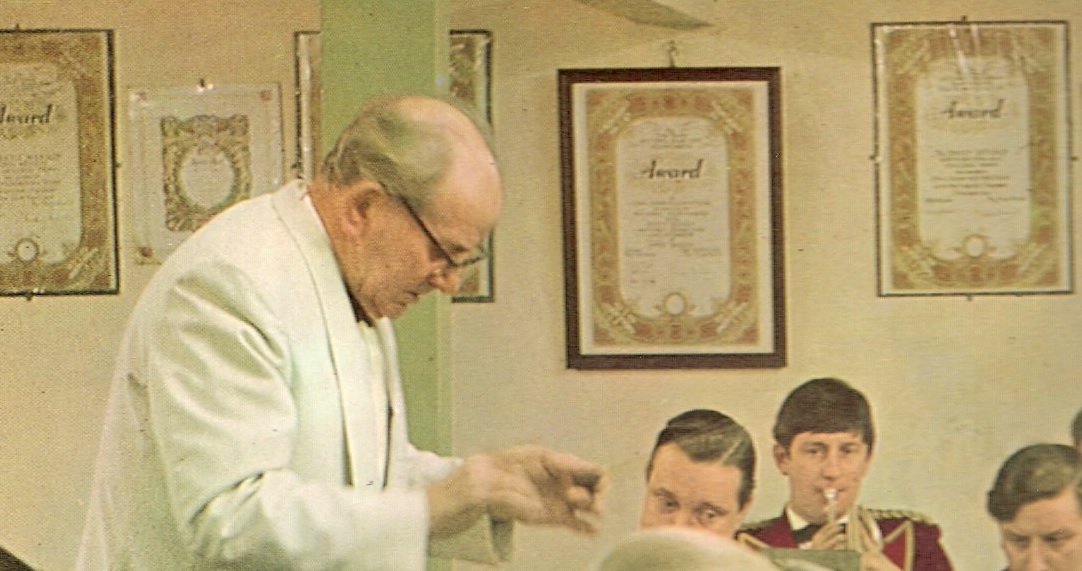
A genius at work - with Brian Evans in the background never getting bored
Genius
Another famous soprano (converted from repiano by Mortimer’s ‘psychology’) was the great Brian Evans.
"Alex was so precise," he said, “You had to play every piece right. Everyone hated him, but they all admired him - I think he was a brass band genius."
Evans was with CWS (Manchester) under Mortimer for ten years; three rehearsals a week and all the jobs - but was never bored. “He was also still admired, even feared by Black Dyke. They used to say - "Let's see what the old bastard's going to do today”.
No one like him
The principal cornet throughout his reign was Derek Garside, who perhaps knew him better than most.
"Alex Mortimer could make a player even if he was using a gas pipe. He was special - a bit like Alex Ferguson. He would be friendly one minute, an ogre the next. He could frighten you to death and then coax the best out of you."
The respect though remains undimmed to this day."Some couldn't stand his methods, but there's no one like him around now."
"Alex Mortimer could make a player even if he was using a gas pipe. He was special - a bit like Alex Ferguson. He would be friendly one minute, an ogre the next. He could frighten you to death and then coax the best out of you."
Gordon Higginbottom also recalled his quixotic approach on the band’s long summer tours – ones that saw him cunningly run through the test pieces for the upcoming major contests.
"I remember we played Leidzen's ‘Sinfonietta’ at Swansea, after only half an hour’s rehearsal - with Mortimer announcing it as ‘Muldoon's Picnic’.”
Unbelievable
In the book ‘Brass Bands in the 20th Century’ co-author Violet Brand wrote that Alex Mortimer “...cultivated in the CWS Band an ethereal quality of sound, which was quite unbelievable in a brass band.”
She remarked that at their peak in the 1960s even Londoners would crowd into the Embankment Gardens to listen in awe at the sheer beauty of the sound.
She wrote, "If one spoke to Alex for an extended period, one ceased to wonder at his remarkable influence on a brass band. The springs of beauty were within him and his quizzical sense of humour was a delight."
Mythical
Geoffrey Brand was one who went to the Embankment Gardens to first listen out of curiosity. He never missed another performance for the rest of the week.
If one spoke to Alex for an extended period, one ceased to wonder at his remarkable influence on a brass band. The springs of beauty were within him and his quizzical sense of humour was a delight.
Despite the obvious brilliance, Alex was for years the ‘nearly man’ at Co-op, although a win at Belle Vue in 1960 heralded the start of what many describe as the best CWS (Manchester) Band of all time.
In 1962 they won the National with a performance of that now has attained almost mythical proportions.
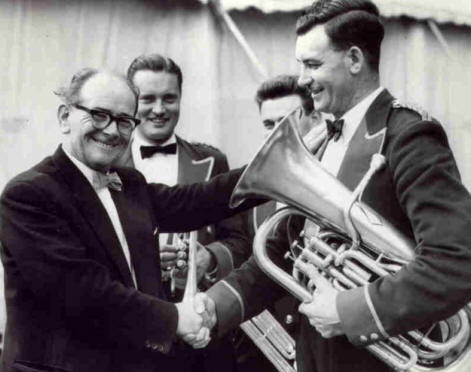
The master psychologist at work?
Derek Garside though still recalls it vividly. “The 1962 win was very special. Alex was very bad, suffering from a mixture of exhaustion and depression. It was only the drugs that allowed him to conduct."
Drawn number 23, another player Jack Howarth, recalled Mortimer coming to their last rehearsal at the Royal College of Organists. Stretched out on two kitchen tables, almost lying down, he took them through, getting it just as he wanted.
“From there we went to the Royal Albert Hall and, when we went on, they brought this high stool out and he came and sat down in front of us. He stood up to start us on 'Force of Destiny' – just three notes – and then sat down again.
Half way through, there’s this sticky passage of semiquaver runs. He stood up for that and then sat down again until the end of the piece. He didn’t conduct or anything. He started us, took us through the sticky section and finished us!
The rest of the time, he was just sitting on this stool.”
Sit down triumph
The Daily Herald headline of Monday 20 October 1962 proclaimed the “Triumph for the sit-down conductor", with their ace reporter Alfred Mackler stating that ‘...a sick man left his bed to help the CWS (Manchester) Band win their first National title playing the overture ‘The Force of Destiny’. ‘
It was certainly one of the most memorable performances ever at the contest - an exhausted Alex Mortimer helped from the platform with the applause still ringing in his ears.
Nothing ever matched it - not the 1960 Medal of the Worshipful Company of Musicians for his outstanding musicianship, or even his 1963 'Spotlight on Service' ceremony at the Nationals as Co-op retained the title on ‘The Belmont Variations’.
Their last major success came at Belle Vue in 1966 on John Ireland’s ‘A Downland Suite’.
Nothing ever matched it - not the 1960 Medal of the Worshipful Company of Musicians for his outstanding musicianship, or even his 1963 'Spotlight on Service' ceremony at the Nationals as Co-op retained the title on ‘The Belmont Variations’.
Decline and death
Although the band had also reached its peak, never to return, they remained a formidable force, even when Mortimer’s health continued to decline.
In late 1970, at the age of 65 he retired as Musical Director. He continued to remain as Musical Advisor, his name and legendary status in the banding annuals secured for all time.
His last victory with them came in 1969 at the North West Area – his last appearance on the contest stage in 1972 at the Albert Hall.
Alex Mortimer died on Wednesday, 14th January, 1976, at the age of 70. A memorial concert was held in New Century Hall, Manchester on Sunday 16th May.
The man who described himself as "only a musical navvie" had taken his final bow.
Tim Mutum
Alex Mortimer’s record
National Brass Band Championships of Great Britain, London
Winner: Black Dyke Mills 1951; CWS (Manchester) 1962, 1963
Runners-up: CWS (Manchester) 1954, 1956, 1957, 1961, 1967
Third: Black Dyke Mills: 1952; CWS (Manchester) 1955, 1958, 1964, 1969
British Open
Winner: CWS (Manchester) 1960, 1966
Runners-up: CWS (Manchester) 1956, 1970
Third: Black Dyke Mills 1953; CWS (Manchester) 1955













